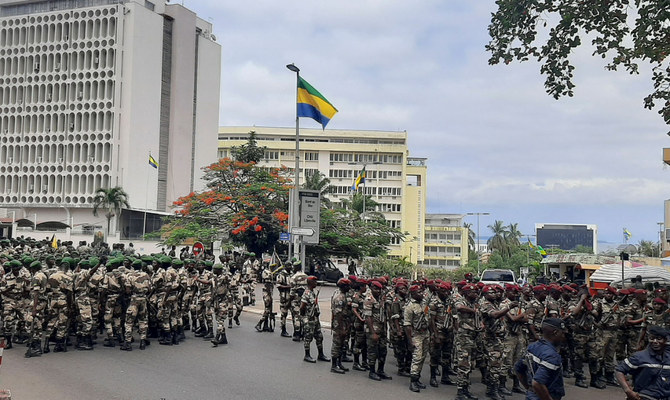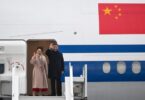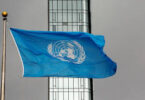Andrew Hammond
European Commission President Ursula von der Leyen previously declared Africa to be a “super priority” for Brussels. However, the EU’s policy on the region potentially lies in tatters after the coup this week in Gabon, which was the eighth in West and Central Africa since 2020.
Much of Africa is rich in natural resources and so the continent has been widely viewed by many European nations as key to their goal of decoupling from Russia, and derisking from China, in the wake of the war in Ukraine. And in the past decade, prior to the pandemic, the region had made a number of democratic gains as it tried to shed a reputation for political putsches.
But now the EU’s vision for Africa is threatened by the recent wave of coups, which Gerard Araud, a French former ambassador, blamed in large part on “European failure,” including by France but also others including Germany and Italy. In particular, he cites the lack of any clear European unity over a shared strategy on Africa.
Even the EU’s chief diplomat, Josep Borrell, has acknowledged that the recent coups are a “big issue for Europe that is opening up a new era of instability in a region which is already very fragile … It’s clear that things haven’t gone well given the proliferation of coups and the presence of (Russian) Wagner gangs.”
Borrell is referring to the fact that persistent insecurity and corruption is increasingly giving rise to what Nigerian President Bola Tinubu has described as a “contagion of autocracy.” Against this backdrop, coups have gained legitimacy while the credibility of democracy has been eroded, with military leaders sometimes proclaiming their rule as a second era of independence.
The scale of the challenge for Europe is so great in part because of changing demographics. In the 1960s, the EU’s collective population was about twice that of Africa. Now Africa’s population is almost double that of the EU, and by 2050 it could quadruple.
The EU launched what it styled as a bold new Africa plan in 2021 but it has been undercut for the reasons Araud highlighted and more besides. Certainly, some in the West foresaw the political risks arising in the desertifying Sahel region and West Africa, and launched multiple interventions.
But this has not been enough and the problems have been exacerbated by wider developmental failures. To meet the UN’s Sustainable Development Goals, markets and governments need to generate more than $270 billion a year in loans or aid for Africa as a whole and this is not happening.
These European and wider Western policy failures have been intensified by competitive rivalries as a range of world powers challenge Europe’s former political power in Africa. From Middle Eastern and Indian initiatives in the region to the great power game between the US and China, geopolitical interest in the continent is growing fast.
Within the EU, France is the member for whom Africa has longest been a foreign policy priority. For almost a century and a half, the nation maintained a substantial empire in the continent. Building from this legacy, President Emmanuel Macron has sought to renew the historical relationship, with only mixed success.
He is well aware that his goal of boosting his nation’s influence across Africa is challenged by the competing attention other nations are paying to the continent. This includes not only great powers such as the US and China but other states such as India, Russia, Turkiye, the UK and some Gulf states.
Africa has assumed new importance to the British in the aftermath of Brexit as London seeks to consolidate ties with key non-EU nations. Given the long-standing historical ties the UK has on the continent, especially with Commonwealth countries, the government wants to combine Britain’s heritage as a great global trading nation with a prosperous, growing Africa.
Russia, under President Vladimir Putin, is also keen to strengthen its foothold in the continent, and trade with Africa has risen about fourfold from the $5.7 billion it was worth in 2009. As Moscow seeks to expand its international influence, the continent is a key target for Putin.
But it is the great powers that are having the most impact on the continent and China is showing the greatest interest of all. Beijing aims to better connect its Belt and Road Initiative with Africa’s development, and about 40 African countries have signed up to the huge infrastructure project.
Under President Joe Biden, the US has also stepped up its interest in the continent by turbocharging its “Prosper Africa” initiative to help boost trade and investment. For much of the Trump presidency, American policy on Africa lacked coherence, clarity and urgency, despite key administration figures, including former National Security Adviser John Bolton, acknowledging that China and Russia were “interfering with US military operations and posed a significant threat to US national security interests” on the continent.
Take Kenya, for example. It is a key partner of the US in the region amid the insecurity and displacement in neighboring countries. Yet, about 70 percent of Kenya’s external debt is now owed to Beijing, and many large infrastructure projects are being carried out by Chinese firms.
This exemplifies the fact that while the upsurge of attention being paid to Africa by Western powers and China is in part a reflection of geopolitical considerations, broader economic calculations are also in play.
From European initiatives to the great power game between the US and China, interest in the continent is only likely to grow during the rest of this decade, especially if its emerging markets come close to fulfilling their significant economic potential in the years to come.







